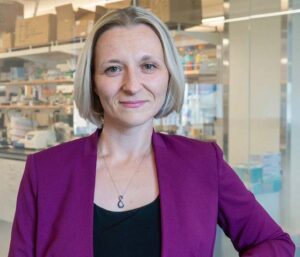Date/Time
Date(s) - 02/16/2024
9:00 am - 10:00 am
Category(ies)
Audrone Lapinaite, PhD
Assistant Professor, School of Molecular Sciences, Arizona State University
Date: Friday, February 16, 2024
Time: 9:00 a.m.
Location: PSH 152
Abstract
CRISPR-Cas, the bacterial immune systems, have transformed the field of genome editing by providing efficient, easily programmable and accessible tools for targeted genome editing. DNA base editors (BE) are a state-of-the-art CRISPR-based technology, allowing for targeted modifications of individual nucleobases within the genome. Among the BEs, adenine base editors (ABEs) have shown great potential due to their ability to convert A-to-G with high efficiency. However, current ABEs have limitations in terms of their specificity, precision and targeting range. Here, we reveal the biophysical basis behind the improved DNA base editing efficiency of ABE8e enzyme, the most efficient ABE to date, through combination of extensive molecular dynamics (MD) simulations with FRET measurements and biochemical assays. We show that dimerization of deaminase domain (TadA8e) plays a pivotal role in the catalysis of DNA deamination. We demonstrate that TadA8e establishes key interactions with both DNA and Cas9 solely because of its dimerization, a phenomenon uniquely observed in ABE8e. Furthermore, we identify key amino acid substitutions introduced during the directed evolution of ABE8e that enhance TadA8e dimerization and DNA deamination efficiency. These findings not only provide insights into the molecular mechanisms driving improved DNA base editing of evolved ABE8e but also offer new directions for the design of ABEs with enhanced precision and an expanded targeting scope.
BioSketch
Audrone (Audrey) Lapinaite is an assistant professor at the School of Molecular Sciences, Center for Molecular Design and Biomimetics, and the ASU-Banner Neurodegenerative Disease Research Center. Her lab focusses on engineering next generation precision genome editing tools with enhanced specificity for biomedical applications and on understanding the molecular mechanisms of bacterial immune systems with the goal of harnessing them for genome, transcriptome and epitranscriptome editing. She is a recipient of the NIH Director’s New Innovator Award. Audrone received her Bachelor’s and Master’s degrees in biochemistry from the Vilnius University (Lithuania), followed by a Ph.D. from the European Molecular Biology Laboratory (EMBL-Heidelberg, Germany) working with Prof. Teresa Carlomagno. She was an HFSP postdoctoral fellow with Profs. Jennifer Doudna and Jamie Cate at UC Berkeley.
